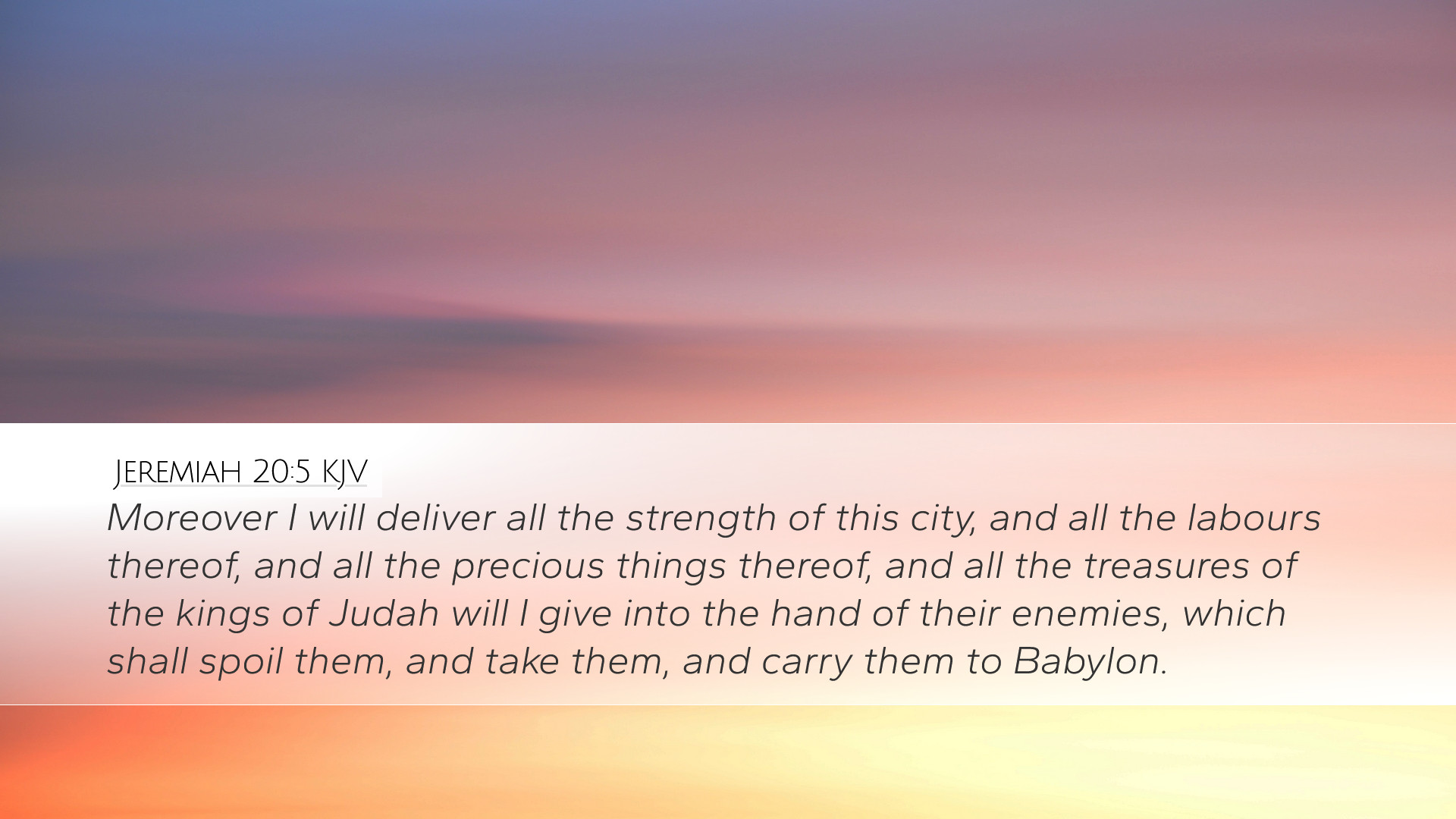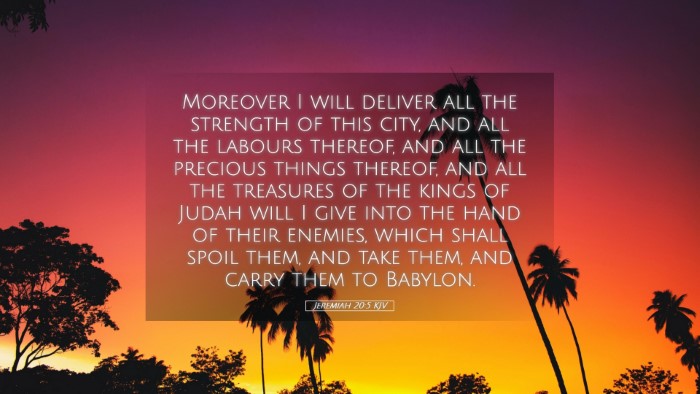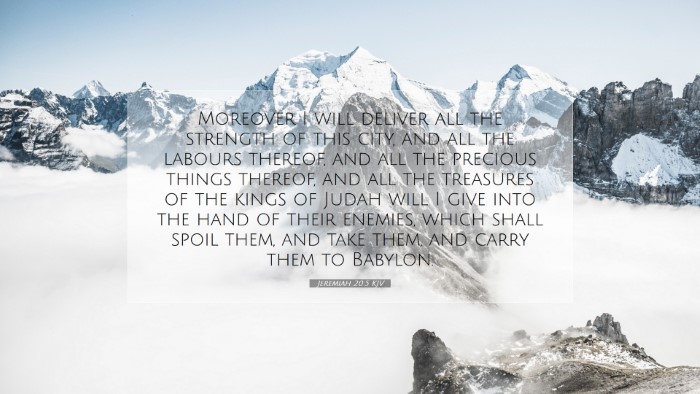Commentary on Jeremiah 20:5
Verse Reference: Jeremiah 20:5 (NKJV) - "And I will give all the wealth of this city, all its produce, and all its costly things, to the hands of their enemies, who will plunder them and seize them," says the Lord.
Contextual Background
The Book of Jeremiah is situated in a tumultuous period in Israel's history, falling during the late monarchy leading into the Babylonian exile. Jeremiah, known as the weeping prophet, faced intense opposition due to the messages he delivered regarding impending judgment and the need for repentance. His experiences highlight the often difficult role of a prophet, where delivering God’s word can lead to personal suffering and societal rejection.
Commentary Insights
This verse occurs within a passage where Jeremiah exposes the impending doom upon Jerusalem due to its rebellion against God. The prophetic declarations in this scripture serve multiple functions: they reveal God’s sovereignty, indicate the severity of national disobedience, and illustrate consequences on both a collective and individual level.
Wealth and Consequences
Matthew Henry highlights the intrinsic connection between spiritual decay and material loss. The wealth mentioned here is not merely a reflection of economic status, but also represents the spiritual disarray that led to divine judgment. He notes that the riches of the city, originally bestowed by God, have ironically become instruments of God’s discipline when turned to idolatry and sin.
Albert Barnes comments on the fact that the "costly things" signifies not only physical wealth but the cultural and spiritual heritage of the nation. When these are given over to the enemy, it indicates the complete takeover that the Babylonians would exercise over the Judean life. This destruction is depicted as a direct consequence of turning away from God and aligns with the prophetic theme throughout Jeremiah, emphasizing that disobedience leads to national disgrace and divine retribution.
Divine Sovereignty
The assertion "says the Lord" underscores the authority behind Jeremiah’s prophecy. Adam Clarke emphasizes that the certainty of this proclamation assures the people that it is not merely Jeremiah's opinion but a directive from Almighty God. The passage thus affirms the ultimate control God maintains over nations and their fate, compelling readers to acknowledge divine authority even amidst calamity.
Psychological Impact on the Prophet
Jeremiah’s personal anguish is significant in understanding this verse. According to Matthew Henry, the prophet's heart bears the weight of this divine message, struggling with the implications not only for the city but for his own life and ministry. His prophetic calling was fraught with emotional distress, which is compounded by the knowledge of impending destruction of those he loved and served.
Albert Barnes points out that Jeremiah stood as a solitary figure, often rejected and mocked, yet he remained faithful. This echoes a broader theological principle: faithfulness to God can often lead to suffering, but it is essential for the fulfillment of divine purpose. The heart of Jeremiah gives modern readers a window into the emotional and psychological toll that divine calling can entail.
Theological Implications
The broader implications of Jeremiah 20:5 speak to the themes of judgment, repentance, and the consequences of collective rebellion against God. Adam Clarke notes that the wealth and produce symbolize not only material blessings but also spiritual prosperity. The loss of this wealth illustrates a theological principle where forsaking the covenant leads to a forfeiture of blessings.
Call to Repentance
This scripture serves as a call for both individuals and communities to evaluate their relationship with God. It serves as a reminder that societal sins have communal consequences. Matthew Henry implores leaders and laity alike to heed the warnings embedded in Jeremiah's lament, emphasizing the necessity of repentance as a means to avert disaster.
Hope Amidst Judgment
Even amidst dire predictions, the message of hope cannot be overlooked. While this verse depicts a grim reality, the overarching narrative of Jeremiah reveals that God’s judgments are always accompanied by opportunities for redemption. Albert Barnes posits that within judgments, believers can find hope in the promise of restoration and the faithfulness of God towards a repentant heart.
Conclusion
Jeremiah 20:5 encapsulates profound insights into the nature of God’s judgment upon a wayward people. As pastors, students, theologians, and scholars delve into this verse, they are invited to reflect on the themes of divine sovereignty, human responsibility, and the severe implications of turning away from God. This duality of judgment and hope is essential not only for understanding the prophetic message but also for applying these teachings in contemporary contexts.
Ultimately, Jeremiah’s journey reminds us of the weight of prophetic calling and the importance of remaining steadfast amidst societal decline, while constantly holding onto the hope of restoration offered through divinely initiated repentance.


